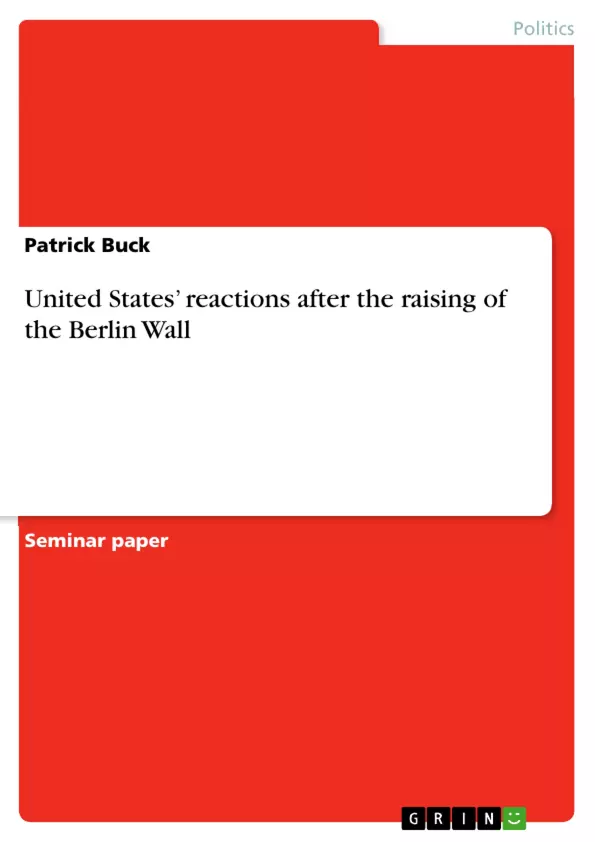The United States of America under President John F. Kennedy showed almost no military reaction after the raising of the Berlin Wall. They sent more troops together with Vice President Lyndon B. Johnson to West Berlin, but there was no intention to reopen the border. Instead the US Government tried to get into negotiations with the Soviet Union about the status of West Berlin. This decision avoided transforming the Cold War into a Hot War, but it also manifested the separation of East and West Germany and made the unification in the near future less likely. The decision helped to establish another socialist state in Europe and locked up 17 million Germans within the borders of East Germany.
This paper will focus on the question why President Kennedy and his main advisers decided the way they did. Did they fear the military strength and the use of the Soviet nuclear arsenal? Or did they think they could reach better results by negotiating? Or did they just trade the eastern part of Germany against a secure status quo for West Berlin? Maybe the situation was seen more as a chance for stability than as a threat?
The basic information for this research will come from the Digital National Security Archive. The original documents should show who gave information to President Kennedy and his advisers. Who were the talking heads during the decision-making process? Who had the most influence? Was it only an inner-American process or were other allies involved, too?
An interesting question is, if there is a change between the evaluation of the situation before and after the raising of the Berlin Wall. So this research will compare some documents before and after the crisis.
Inhaltsverzeichnis (Table of Contents)
- Introduction
- Research Questions
- A Military Response as an Option?
- The Image of the Enemy
- The Call for Propaganda
- Travel Restrictions as Reprisals
- Negotiations
- Unification or Status Quo?
- Groupthink?
- Other Views
- Conclusion
Zielsetzung und Themenschwerpunkte (Objectives and Key Themes)
This paper examines the reasons behind President Kennedy's decision not to take military action after the erection of the Berlin Wall in 1961. It explores the considerations behind this decision, analyzing the available options and the influence of key advisors.- The assessment of the Soviet Union's role in the crisis
- The potential for using the situation for propaganda against the Soviet Union
- The use of travel restrictions against East German officials
- The potential for negotiations with the Soviet Union
- The question of German reunification
Zusammenfassung der Kapitel (Chapter Summaries)
The first chapter introduces the context of the Berlin Wall's construction, highlighting the flow of refugees from East Germany to West Berlin. Chapter two outlines the research questions regarding President Kennedy's decision-making process, including his motivations for avoiding military action. Chapter three explores the military response option, revealing that while the US considered increasing military capacity, it ultimately opted for a diplomatic approach. Chapter four examines the US perception of the Soviet Union as the primary threat, highlighting the belief that the East German government was weak and unstable. Chapter five delves into the propaganda strategy employed by the US, utilizing the Wall's construction to expose the shortcomings of Soviet communism. Chapter six investigates the proposed travel restrictions for East German officials as a form of reprisal. Chapter seven focuses on the debate surrounding negotiations with the Soviet Union, highlighting the different viewpoints within the administration. Chapter eight explores the discussion about the future of East and West Germany, including the potential for reunification. Finally, chapter nine assesses the presence of groupthink within the Kennedy administration during this crisis, concluding that the decision not to go to war was the result of careful deliberation and not a product of flawed decision-making.
Schlüsselwörter (Keywords)
The main focus of this paper is on the Cold War, the Berlin Wall, the Kennedy administration, the decision-making process, groupthink, propaganda, and diplomacy. It analyzes the US response to the Berlin Wall crisis, exploring the reasons behind the decision to avoid military action and engage in negotiations.Frequently Asked Questions
Why did President Kennedy decide against military action after the Berlin Wall was built?
Kennedy wanted to avoid a "Hot War" and potential nuclear conflict with the Soviet Union, opting for diplomatic negotiations instead.
What was the US propaganda strategy regarding the Berlin Wall?
The US used the construction of the wall to highlight the failures of Soviet communism and the East German regime's instability.
Who were the key advisors in Kennedy's decision-making process?
The paper analyzes the roles of various advisors and the influence of Vice President Lyndon B. Johnson during the crisis.
Did "Groupthink" play a role in the US response?
The research concludes that the decision was based on careful deliberation rather than flawed "Groupthink" dynamics.
What were the consequences of the US choosing the status quo?
It manifested the separation of Germany for decades and helped stabilize the socialist state in East Germany at the time.
- Citar trabajo
- Patrick Buck (Autor), 2006, United States’ reactions after the raising of the Berlin Wall, Múnich, GRIN Verlag, https://www.grin.com/document/229530



